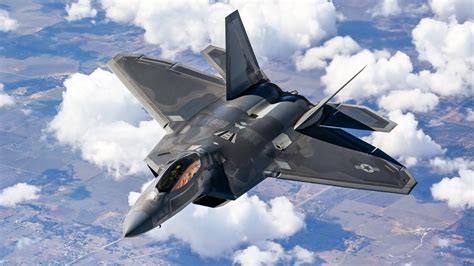F 22 Raptor Maximum Speed

The F-22 Raptor, a fifth-generation stealth fighter developed by Lockheed Martin for the U.S. Air Force, is renowned for its unparalleled speed, agility, and advanced technology. As one of the most capable air superiority fighters in the world, its maximum speed is a key factor in its dominance on the battlefield. Below is a comprehensive exploration of the F-22 Raptor’s maximum speed, its technical underpinnings, and its strategic significance.
Maximum Speed of the F-22 Raptor
The F-22 Raptor has a maximum speed of Mach 2.25, which translates to approximately 1,500 miles per hour (2,414 kilometers per hour) at high altitudes. This speed is achieved through a combination of its powerful engines, aerodynamic design, and advanced materials.
Technical Factors Enabling High Speed
1. Engines: The Heart of the Raptor
The F-22 is powered by two Pratt & Whitney F119-PW-100 turbofan engines, each producing 35,000 pounds of thrust in full afterburner mode. These engines are designed to provide exceptional thrust-to-weight ratio, enabling the aircraft to achieve supersonic speeds without the need for reheat (afterburner) at high altitudes.
2. Aerodynamic Design
The F-22’s sleek, stealthy design minimizes drag, allowing it to slice through the air with minimal resistance. Its diamond-shaped wings and vectored thrust nozzles enhance maneuverability at high speeds, while its radar-absorbent materials reduce its radar cross-section, making it harder to detect.
3. Supercruise Capability
Unlike many other fighter jets, the F-22 can sustain supersonic speeds without relying on afterburners, a feature known as supercruise. This capability is made possible by the combination of its powerful engines and efficient aerodynamics, allowing it to travel at speeds exceeding Mach 1.5 for extended periods.
Strategic Significance of the F-22’s Speed
1. Rapid Response and Deployment
The F-22’s maximum speed enables it to reach conflict zones quickly, providing a decisive edge in time-sensitive missions. Its ability to cover vast distances in a short time makes it a critical asset for both defensive and offensive operations.
2. Air Superiority Dominance
Speed is a cornerstone of air superiority. The F-22’s Mach 2.25 capability allows it to outpace and outmaneuver potential adversaries, ensuring control of the skies. This is particularly crucial in scenarios where enemy aircraft rely on slower speeds or lack supercruise capabilities.
3. Stealth and Speed Synergy
The F-22’s speed complements its stealth capabilities. By combining high speed with low observability, the Raptor can strike targets before being detected, reducing the risk of enemy retaliation.
Comparative Analysis: F-22 vs. Other Fighters
| Aircraft | Maximum Speed | Supercruise Capability |
|---|---|---|
| F-22 Raptor | Mach 2.25 | Yes |
| F-35 Lightning II | Mach 1.6 | No |
| Su-57 Felon | Mach 2.0 | Yes |
| Eurofighter Typhoon | Mach 2.0 | No |

Historical Context and Development
The F-22’s speed was a design priority from its inception in the 1980s as part of the Advanced Tactical Fighter (ATF) program. The goal was to create a fighter that could dominate the skies against advanced Soviet aircraft like the MiG-29 and Su-27. The Raptor’s first flight occurred in 1997, and it entered service in 2005, setting new benchmarks for speed, stealth, and maneuverability.
Future Implications
While the F-22 is no longer in production, its speed and capabilities remain unmatched by most current fighter jets. However, emerging technologies, such as hypersonic weapons and sixth-generation fighters, may challenge its dominance in the future. The U.S. Air Force is already exploring next-generation platforms like the Next Generation Air Dominance (NGAD) program to maintain air superiority.
FAQ Section
What is the F-22 Raptor's maximum speed?
+The F-22 Raptor has a maximum speed of Mach 2.25, approximately 1,500 mph (2,414 km/h) at high altitudes.
Can the F-22 Raptor achieve supercruise?
+Yes, the F-22 can sustain supersonic speeds without using afterburners, a capability known as supercruise.
How does the F-22's speed compare to other fighters?
+The F-22's Mach 2.25 speed is higher than most contemporary fighters, including the F-35, Su-57, and Eurofighter Typhoon.
Why is the F-22's speed strategically important?
+Its speed ensures rapid response, air superiority dominance, and synergy with its stealth capabilities, making it a formidable asset in modern warfare.
Is the F-22 still the fastest fighter jet?
+While the F-22 remains one of the fastest operational fighters, emerging technologies and next-generation platforms may challenge its speed dominance in the future.
Conclusion
The F-22 Raptor’s maximum speed of Mach 2.25 is a testament to its engineering excellence and strategic value. Its ability to combine speed, stealth, and agility makes it a cornerstone of U.S. air superiority. As technology evolves, the Raptor’s legacy will continue to influence the design of future fighter jets, ensuring that speed remains a critical factor in aerial dominance.